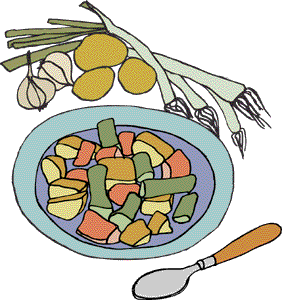![[Metroactive Dining]](/gifs/dining468.gif)
[ Dining Index | North Bay | Metroactive Home | Archives ]
Edible Nostalgia
Sometimes there's no substitute for cured pork fat and ketchup gravy
By Marina Wolf
The nights are cold, my job sucks, and cabbage is the freshest thing in the produce aisle. Don't bother me. I'm having a Russia moment. They come along every winter, when I look up and remember that good tomatoes are still at least five or six months away. It might be just another case of seasonal affective disorder, or SAD, except I have a place and time to attach to the feeling: St. Petersburg, 1992-'93. I'm simply homesick.
Why I should have warm feelings for this winter wonderland of food shortages is not immediately clear, even to myself. This was a place in which sugar disappeared from stores for weeks at a time, and the best price for fish was found in the back of a dirty truck. Aren't I just romanticizing a state of anarchic malnutrition?
Yes and no. Yes, my experience was rosier than the reality for most Russians. My companion and I were earning dollars, which meant that the farmers' markets, with decent produce at exorbitant prices, were a viable option. And there were two of us to stand in lines, plus a Russian roommate who was happy to schlep shopping bags and make Turkish coffee in exchange for his share of the rent.
In spite of such luxuries, however, the pursuit of food demanded a significant expenditure of time, money, and energy, so we learned to appreciate the thrill of the hunt. There was always something on the street, melons from Moldova or soy sauce or British crackers. One December we feasted for three weeks on mandarins and blood oranges, which had entered the country as aid from Italy and "fell off the back of a truck" at prices well below market value. If that's not a humanitarian act, I don't know what is.
The deli shops had their moments of excitement, too. If you could see past the smudged showcases and cats dozing on the scales (hey, at least there weren't any mice!), there were some real finds, like imported Dutch cheese instead of the chalky domestic stuff. As for the kolbasa counters, well, charcuterie would be too posh a term for the coarse-grained, thick-skinned bologna, but when meat prices soared, we looked forward to our dinner of fried eggs and bologna like anybody else.
Of course, we also looked forward to getting back to a normal system of food distribution. Our first return visit to an American grocery store was as exciting as we had imagined. And even now, years later, I still know we've got it good here. That cabbage is really fresh, and there is even some kale and good firm carrots lying about. The fish is laid out in clean ice, and there is always sugar on the shelf.
And yet . . . and yet, in the sameness of winter one longs for something else, a change of terrain or taste. So maybe it's time for a field trip, 60 miles to the nearest Russian deli, where I can summon up my deteriorating language skills to pick up some pel'meni. These are like ravioli, only more packed, or maybe like wontons, only more securely sealed. In Russia, pel'meni were as widespread as TV dinners are here. We liked to throw them into a sputtering pan of oil and fry them on three sides until the pasta turned golden and crisp. Then we dipped them in what passed for ketchup and ate them with our fingers in front of the confusing evening news.
Here in the States, pel'meni are a more handcrafted item, selling for considerable sums at Orthodox church events. So when I visited the nearest Russian deli recently and found a 100-count bag for $10, I snagged it, feeling that familiar shiver of excitement at a miraculous food find. The respectful treatment for pel'meni is a careful simmering in beef broth, topped with a dollop of sour cream and a splash of soy sauce.
As long as I'm there at the deli, I always get a handful of candies, stale usually, with strange names like Red Riding Hood or Mishka. And of course I get a pound of salo, which has no equivalent in any other cuisine that I'm aware of. It is essentially dry-cured pork fat, very mundane if not crude, but the smell of it, salty and rich, takes me back to a little shop near the Mayakovskaya metro station.
I'm sure other stores in the city sold it, but our roommate insisted that it was the most reputable source. The hurried shopkeeper would pull a huge piece of salo out of a barrel of salt, brush it off, and hack off a small chunk with a knife that was as sharp as it was dirty, that is to say, very. He would wrap it in plain waxed paper, as expertly as an origami artist. Our Russian roommate showed us how to cut it into bits, fry it crisp, and crack eggs over the whole greasy mess. Traditionally, though, salo was eaten raw on bread spread with fiery mustard.
I have the mustard at the back of my cupboard. All that's missing is the salo. And yes, I know about cholesterol and trichinosis, but I don't care. I just need a break from here and now, and a taste from then and there might help.
[ North Bay | Metroactive Central | Archives ]
Copyright © Metro Publishing Inc. Maintained by Boulevards New Media.
![]()

From the March 14-20, 2002 issue of the North Bay Bohemian.